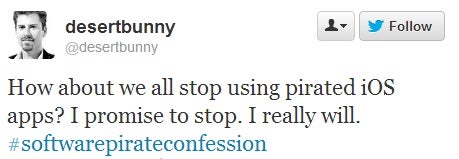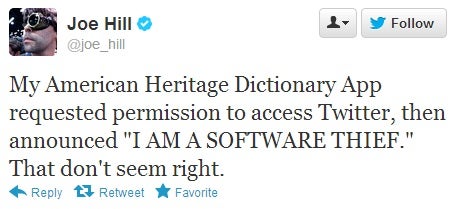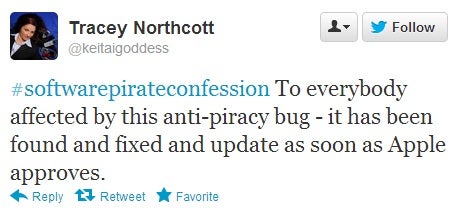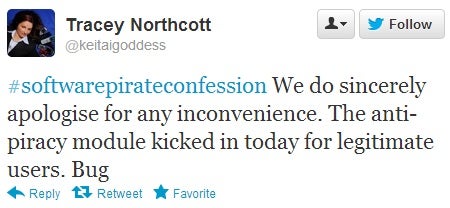When a large number of people on the Internet receive the same message at once, it is known as spam. Try looking that term up using an iPhone dictionary app, and you might become a spam victim too.
A number of reports suggest that dictionary and thesaurus applications by developer Enfour for iPhone and iPod Touch devices have autotweeted messages from their users’ Twitter accounts, accusing those users of software piracy.
“How about we all stop using pirated iOS apps? I promise to stop. I really will. #softwarepirateconfession,” read a typical tweet.
Many Twitter users, including the Daily Dot’s Editor-in-Chief Nicholas White, Locke & Key comic writer Joe Hill, and Teller (of Penn and Teller fame), have been hit by the autotweets since Nov. 1.


Andreas Ødegård of tech site Pocketables brought greater attention to the problem in a blog post. He suggested that the Oxford Deluxe app, for which he paid $55, was tweeting the message because of a jailbreaking app he had installed so he could revert to older versions of apps that no longer worked.
However, White said he had never jailbroken his phone nor had he installed any jailbreaking apps on his device when the $24.99 American Heritage Dictionary app spammed his Twitter account and accused him of software piracy.
A search for the hashtag used in the autotweets, #softwarepirateconfession, reveals hundreds of people who have been affected. The reviews on each app’s page in the Apple App Store reveals many dissatisfied customers.
Back on Nov. 1, Enfour’s Tracey Northcott apologized for the incident:


The apps were updated on Nov. 1 without any indication as to the problem in the changelog in Apple’s App Store. The update note simply read: “Update now! Very important. Crucial maintenance release.”
Neither Enfour nor UniDict, which powers many of the affected apps, returned requests for comment.
Northcott claimed just a quarter of its users have shelled out for the products, and she’s urged many of those affected, including Teller, to update the apps to the most recent versions. Ars Technica noted that Enfour published an apology on its website in Japanese on Nov. 5.
Whether users of the app have stolen it or not, that Enfour is autoposting such name-and-shame tweets from users’ Twitter accounts is a sketchy practice. To make matters worse for the firm, Ødegård provided a screenshot of his receipt for the Oxford Deluxe app and said he “intend[s] to pursue the matter.” It wouldn’t be surprising to see other claims of libel or defamation made.
It appears Enfour’s crusade against software thieves may ultimately cause the company more trouble than it was worth.
UPDATE: Enfour has posted an apology on the front page of its website (PDF), including the following explanation of its anti-piracy scheme:
We have seen a 1:100 ratio of legal to pirated copies of our software. Ouch. We can’t thwart truly determined hacker & crackers, but we wanted to possibly shame those who were opportunistically stealing our software. Just like installing a shop-lifting alarm in a store, we thought we were being creative with a notification and a timed tweet for users of a cracked app.
In retrospect, this was not the wisest choice.
Photo by Muffet/Flickr


